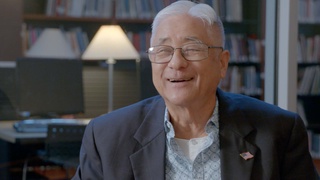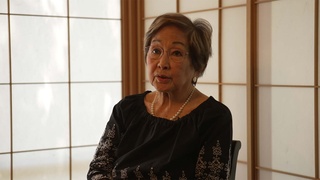Interviews
Her grandfather and Dr. Thompson
Oh, yeah. Sure I was happy. Oh, I said, free, free.
So we’re going back to our house. The weeds are up so high. But you know, we took grandpa with us. Grandpa was still living. And you know, so we put him in the back seat and I was taking care of him. And when we get home there was that kind of a beautiful orangey colored roses blooming. So I cut that and put it by his bedside. And he said, "oh, that’s beautiful," he says, "Kirei dane." "Grandfather, what you have planted." And he just nods his head.
And then, in the meantime, Dr. Thompson, who was a wonderful doctor. He was a German doctor. He’s the one that has built this Burbank hospital. It’s a small hospital. And that’s where he kept my grandpa and my grandmother when we went to camp. In the basement. He had them there. He said, I’ll take care of them.
And then somehow the army found out that they were there. They come to Dr. Thompson. They come with the rifles and the guns, just an army of people. “You have enemy aliens down here.” So they come there, and he said, oh, he felt so bad, but then they took them away.
But Dr. Thompson was wonderful. When we came back out from camp and grandpa died at home, he even got everything all prepared with the other mortuary in North Hollywood. He took care of all that funeral for my grandfather. The casket, got us flowers. Everything. So really, really grateful, Dr. Thompson.
Date: May 24, 2011
Location: California, US
Interviewer: John Esaki
Contributed by: Watase Media Arts Center, Japanese American National Museum








